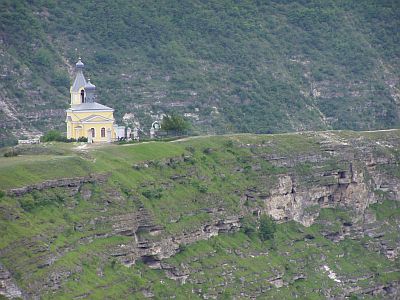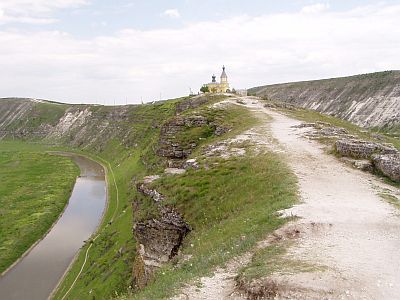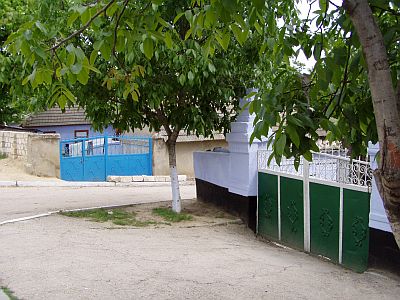Official Name
Orheiul Vechi. Note that the 'h' is pronounced as the Scottish 'ch' in 'loch'. Vechi is pronouned 'wag'. The word 'vechi' simply means 'old'. In contradiction to English, adjectives are often written behind nouns; the ending '-ul' is then added to the noun. Hence, Orheiul Vechi stands for Old Orhei, and the Russian word is just the translation of the name: Старый Оргеев (Staryi Orgeyev). The 'modern' town of →Orhei is around 20 km away in the west.
Location

| ||
| Orheiul Vechi |
Some 35 km north-east of →Chişinău, Orheiul Vechi stretches along river Răut, which flows into the river Nistru (Dniestr) near Dubăsari further to the east. The more you get to the east, the deeper the river valley becomes. Here, the Răut is cutting into a thick layer of soft limestone.
Population
About 29,600 - the netto growth rate is negative.
Orientation
Recently, the monastery is inhabited by a couple of monks again. Near Old Orhei there's the small village of Butuceni and, on the other side of the river, the village of Trebujeni. The latter seems to have around 1,000 inhabitants, Butuceni is much smaller.
Landscape
The rather small river Răut has created a deep valley during the last 10,000 years. The surface layer is dominated by very soft coquina (also: shell limestone). It's even possible to pull out the seashells with your bare hands. The river meanders in a deep S-shaped valley through the plateau, the difference between the top of the plateau and the river is probably around 60 metres. The cliffs are riddled with holes like a giant Swiss cheese. Most of Moldova consists of rolling hills and some flat areas, so it's quite a surprise to see such a wild, rugged and certainly unique setting.
Getting there / transportation
There are several buses a day running between →Chişinău and Orheiul Vechi. It's much more difficult to get there from nearby →Orhei: There's only one daily bus, leaving from Orhei at 12:45. Although less than 20 km away, it takes 1½ hours, the fare is 5 Lei). Unfortunately, there's no bus back to Orhei. The last bus to Chisinau seems to leave at 4 pm - after that, there seems to be nothing. You can't even hitchhike, since there are no cars or horse carts passing by. All you can do is walking to the next village (Brăneşti, about 5 km) and trying to get away from there.
There are many underground monasteries or similar things on this planet (as for example in →Kyiv (Ukraine), →Pak Ou (Laos), →Petra (Jordan) and →Luòyáng (China) just to name but a few), but not many are embedded in such an interesting setting. The remoteness and the fact that it's easy to defend make it an ideal place for erecting a monastery. Orthodox monks found out about that in the 13th century and founded the Mănăstire în Peşteră (Cave Monastery).
The Moldovan national hero Ştefan cel Mare (Stephen the Great) added a fortress in the 15 th century atop the ruins of an older fortress, but the fortress was completely destroyed - today, only a few stones are left. The monastery was abandoned during the 18th century. However, since 1997 it is maintained by monks again.

| ||
| A view of the cliff - the monastery is below the church |
All that you see when you get off the bus is a small belfry and a small, yellow church perched high on the limestone cliff. The small river flows in front of and behind the cliff, so it's not possible to take a short cut across the fields (as we found out after a long walk). Instead of that you will need to follow the road and pass the bridge. Before that, you will come along the visitor's centre, including the ticket counter and a small museum. And a small cafeteria. Admission fee is 5 Lei, but no one showed interest in the tickets.

| ||
| On the top of the limestone cliff |
When you walk straight ahead after passing the bridge, you will soon get to the small village Butuceni. Walk left and follow the slope - it's the entrance to the peninsula with the monastery. The landscape is just great - green meadows and a small village to your right, the abyss to your left. Right below the belfry there's the hidden entrance to one of the six parts of the monastery. There's also a small underground chapel with a large hole to step outside - there you will find yourself locked somewhere in the middle of the limestone wall. Inside the chapel, a monk, he's as kind as he's old, sells devotional objects. Behind the chapel you will find the dark and wet sleeping chambers of the monks.

| ||
| A view from the chapel to the fields outside |
When you look around, you will notice that the cliff on the other side of the river is riddled with holes, too. However, that part is not easily accessible and would require a lot of time and probably even special equipment. Walking around the entire valley on the top of the cliff is just great and provides spectacular views of the monastery and the surroundings. The land is slowly falling away to the east - the Dniestr and the lowland behind the river is close.

| ||
| The colourful village of Trebujeni |
When you surround the valley on the top of the cliff, you will need around 1 hour to get to the small village of Trebujeni sprawling along the river. It seems to be a very old village, consisting of traditional houses only. A place where time stood still. Quite typical for Moldova as well as Moldovia (=Eastern Romania) is the light-blue colour of many houses. There's a small grocery next to the bus stop. Except for this, there's neither a place to stay nor a place to eat.
It doesn't look like there's a place to stay around. It might be possible to ask around in the village if it's okay to stay for a handful of Lei. The best option is to return to →Chişinău or to go ahead to other places.
- orhei.dnt.md English version of the offical website of the museum. Includes beautiful pictures and plenty of information
Do you have or do you know a good website about Orheiul Vechi? Don't hesitate, let me know! After checking it, I would love to add it to the link list. You can submit a link by using the →contact form. Note that commercial websites will be treated differently.
memy wrote:
false very false about acoomodation! there are several places to sleeep or stay! i live shete and i know!! there are such things as "pensiune". it is a mini hotel where you can stay, and eat traditional food, and live a few weeks!!! come to trebujeni!!!
Posted by memy on November 17, 2008 03:15
©2024 Europe-East.com

 Albania
Albania Moldova
Moldova